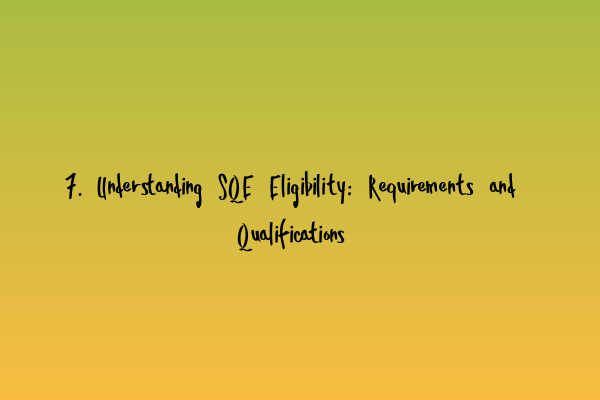Understanding SQE Eligibility: Requirements and Qualifications
When it comes to pursuing a career as a solicitor in the UK, one of the key steps is passing the Solicitors Qualifying Examination (SQE). Before you embark on this journey, it is crucial to understand the eligibility requirements and qualifications for the SQE. In this article, we will break down the essential information you need to know to ensure you meet the necessary criteria.
1. Academic Qualifications:
To be eligible for the SQE, you must hold an undergraduate degree or equivalent qualification. This degree can be in any subject, as there are no specific academic requirements related to the subject matter. However, having a background in law or a related field can be advantageous, as it provides a solid foundation of knowledge for the SQE exams.
2. English and Welsh Law:
The SQE is designed to test your knowledge and understanding of English and Welsh law. Therefore, it is essential that you have a sufficient understanding of these legal systems. If you have obtained a law degree from an overseas jurisdiction, you may need to demonstrate that you have acquired the necessary legal knowledge to meet the requirements of the SQE.
3. Character and Suitability:
As a future solicitor, you must meet certain character and suitability requirements. This involves disclosing any criminal convictions, bankruptcy proceedings, or any other relevant factors that could impact your ability to practice law. The Solicitors Regulation Authority (SRA) assesses each applicant’s character and suitability on a case-by-case basis.
4. Work Experience:
Gaining practical work experience is a vital component of becoming a solicitor. The SRA requires candidates to complete a minimum of two years of qualifying work experience (QWE) before they can qualify as a solicitor. This work experience should cover a range of legal activities and provide you with opportunities to develop key skills required for practice.
5. Eligibility for Foreign Lawyers:
Foreign lawyers who wish to qualify as solicitors in England and Wales can also pursue the SQE route. However, they may need to meet certain additional requirements, such as demonstrating proficiency in English and completing the Qualified Lawyers Transfer Scheme (QLTS) assessments.
6. Additional Considerations:
It is important to note that the SQE is a new assessment framework, and its implementation may bring about changes to the eligibility requirements. Staying updated with the latest information from the SRA and keeping track of any amendments is crucial to ensure you meet the current criteria.
In conclusion, understanding the eligibility requirements and qualifications for the SQE is crucial for anyone aspiring to become a solicitor. By meeting the academic qualifications, demonstrating a solid understanding of English and Welsh law, showing good character and suitability, gaining practical work experience, and considering any additional requirements for foreign lawyers, you can ensure that you are on the right path towards achieving your goal.
For more information on preparing for the SQE exams and maximizing your chances of success, check out the following related articles:
– Strategies to Tackle SQE MCQs: Mastering Multiple-Choice Questions
– Scenario-Based Questions in SQE2: Become a Master Problem-Solver
– Demystifying the SQE Exam Pattern: Knowing What to Expect
– SQE Strategies: Proven Tactics to Ace the Solicitors Qualifying Examination
– SQE Case Studies: Applying Knowledge in Real-Life Scenarios
By utilizing this information and taking the necessary steps, you can increase your chances of successfully navigating the SQE and achieving your goal of becoming a qualified solicitor in England and Wales. Good luck on your journey!
